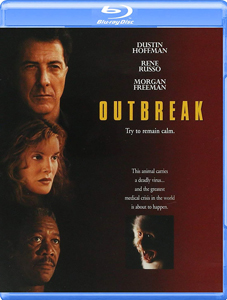For about three-fourths of “Outbreak” (1995), director Wolfgang Petersen masterfully crafts a slow-burn thriller that makes you reflect on how Hollywood used to make great blockbuster disaster flicks. It doesn’t stick the landing when it switches its focus to the bizarrely evil machinations of a veteran US Army general (Donald Sutherland’s Donald McClintock), who embarks on a helicopter pursuit of our heroes.
Harrowing, but reassuring
But most of “Outbreak” is great stuff — harrowing but ultimately reassuring in this age of coronavirus fears. Even if the scientific believability is sometimes strained, the emotions are real thanks to an all-star cast led by Dustin Hoffman and Rene Russo as ex-spouse scientists Sam and Robby.
They still love each other and there’s no clear reason why they got divorced – it’s a disaster-flick cliché, but the actors sell it. Cuba Gooding Jr. is another likable presence as Salt, who blows his first mission and spends the rest of the film totally redeeming himself.

“Outbreak” (1995)
Director: Wolfgang Petersen
Writers: Laurence Dworet, Robert Roy Pool
Stars: Dustin Hoffman, Rene Russo, Morgan Freeman
Written by Laurence Dworet and Robert Roy Pool, “Outbreak” opens with a title-card quote from an expert saying a virus is what will most likely wipe out humanity. Early scenes at Ground Zero in Africa give us striking images such as an infected boy crying amid two dead relatives.
The Motaba virus kills in 24 hours and would wipe out the whole population of the USA in 48 hours, so it’s a little different than COVID-19 in that sense; it’s a blockbuster virus on par with “Armageddon’s” Texas-sized asteroid.
The simple human moments are where “Outbreak” shines. A symptomatic woman departs her home to be tested for Motaba; her daughter moves forward but the dad holds her back, saying “You can’t hug Mommy right now.” Cue a crying jag on par with that Anthony Anderson meme.
Silly moments and scary moments
It gets a bit winky when a coughing and sweating man stumbles through a crowded movie-theater concession line – but hey, meta commentary was less of a cliché in 1995. Other scary moments are iconic. I remembered the scene of Casey’s (Kevin Spacey) Hazmat suit ripping even though I hadn’t seen this film in 20 years.
If you’re looking for cliches, “Outbreak” won’t let you down, notably when Morgan Freeman’s General Billy Ford hangs up the intercom after ordering his troops to bomb a California town and says “God have mercy on us.” (What bad luck of the draw for Freeman that he gives a speech about the importance of wiping out innocents for the greater good, and a year later Bill Pullman gets to do the “Independence Day” speech.)
There’s an almost-decent thread here about “following orders versus doing what’s right,” a conflict I honestly don’t envy soldiers for. While Sam is the clear Good Guy and McClintock is the clear Bad Guy, Ford occupies a middle ground, and some of his discussions with Sam are quite pointed.

For a while, “Outbreak” even makes us think the military’s long view has a certain kind of logic. At the same time, the notion of government cover-ups certainly resonates today; I wonder if the concept was considered sillier in 1995.
A confusing finale
But the wannabe-“Rambo” grand finale is so confusing that it blows away “Outbreak’s” nuances and layers. I imagine that off-screen, after the credits roll, McClintock is brought up on a court martial for Being Evil. I know that’s not a real criminal offense, but it’s the best way to explain what he does in “Outbreak.”
It would make a certain amount of sense if he wants to kill Sam because Sam could expose McClintock’s secret military actions; however, McClintock simply “wants a weapon” (to quote Sam). How he would acquire a weapon by bombing a town of infected people on the verge of being cured is so unclear that it almost derails the whole film.
However, even when “Outbreak” gets ridiculous, the medical scare is never far away. The effects makeup – including bleeding from the eyes, bruises and pustules — is such that we know we don’t want Motaba. Suffice it to say that stocking up on toilet paper won’t save you. And the lags between our heroes getting holes in their Hazmat suits have us thinking about the danger of a just such a puncture.
“Outbreak” excels when it unleashes these little terrors, remembering that Motaba is much scarier than McClintock. The virus might not be wholly realistic, but its unknown qualities are what make it terrifying. The Evil General, though – we’ve seen him in other movies, and he should’ve stayed there.

